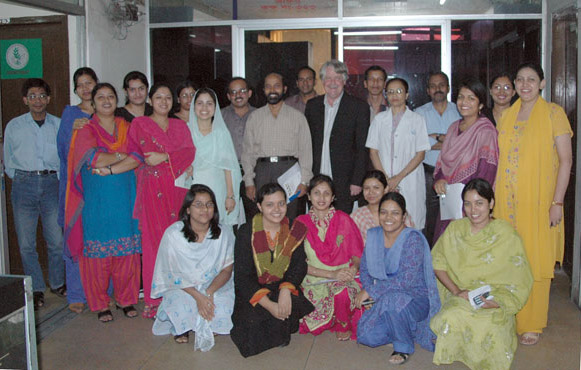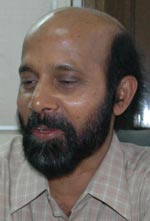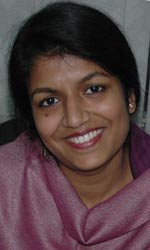SWEDISH SOUTH ASIAN STUDIES NETWORK
Report from visit to BIRDEM, Dhaka, 5 December 2005
Web page: http://www.dab-bd.org/aboutbird.htm
 In
the afternoon Lars visited the Biomedical Research Group (BMRG) at the
Bangladesh Institute of Research and Rehabilitation in Diabetes, Endocrine
and Metabolic Disorders, BIRDEM (run by the non-profit social organisation,
Diabetic Association of Bangladesh), in their hospital building on Kazi
Nasrul Islam Avenue, next to the Sheraton Hotel.
In
the afternoon Lars visited the Biomedical Research Group (BMRG) at the
Bangladesh Institute of Research and Rehabilitation in Diabetes, Endocrine
and Metabolic Disorders, BIRDEM (run by the non-profit social organisation,
Diabetic Association of Bangladesh), in their hospital building on Kazi
Nasrul Islam Avenue, next to the Sheraton Hotel.
BIRDEM is a well-known institution in Dhaka. It was established in 1980
by the legendary Dr. Mohammed Ibrahim (who foresightedly had founded the
Diabetic Association already in 1956). The hospital is housed in two buildings,
one 15-storied with 542 beds for paying patients, and a three-storied
one. The income from this plus from diagnostic tests makes it possible
to treat on an average 3.000 people free of charge in the largest diabetes
out-patient clinic in the world.
 Dr.
Liaquat Ali (photo to the right),
who spent several years in Sweden and defended his PhD at the Dept. of
Medical Cell Biology, Uppsala University in 1990, is Professor at the
Dept. of Biochemistry and Cell Biology, and the coordinator of the Biomedical
Research Group (BMRG), which has three major research fields:
Dr.
Liaquat Ali (photo to the right),
who spent several years in Sweden and defended his PhD at the Dept. of
Medical Cell Biology, Uppsala University in 1990, is Professor at the
Dept. of Biochemistry and Cell Biology, and the coordinator of the Biomedical
Research Group (BMRG), which has three major research fields:
1. Plant materials as a source of drugs.
2. Etiopathogenesis of diabetes and its complications in Bangladesh population.
3. Nutritional evaluation of food materials.
Diabetes is growing fast in Bangladesh, due to changed life styles among a part of the population with less exercise and a change in food habits. Liaquat Ali was instrumental in initiating a collaborative Swedish-Bangladeshi research program on anti-diabetic plant materials in 1991, also joined by the Dept. of Chemistry, Dhaka University (see report on our meeting with Prof. Mosihuzzaman). It was supported by the International Science Programme in the Chemical Sciences (ISPIC) at Uppsala University from the start, and has been ever since. ISPIC has contributed with laboratory equipment and other research infrastructure. The Third World network for research on anti-diabetic plants, AFASSA, has its office within the same premises as BMRG.
 I met
Liaquat Ali in his office room, along with the deputy coordinator of the
research group, Dr. Begum Rokeya
(photo to the left), and Dr. Mohammed
Zahid Hassan. Dr. Ali showed a power point presentation about BIRDEM,
the unique concept of public-private partnership, with capital investments
coming from the government, through which also all foreign grants go,
and the running expenditures self generated, and enough to fund the free
services.
I met
Liaquat Ali in his office room, along with the deputy coordinator of the
research group, Dr. Begum Rokeya
(photo to the left), and Dr. Mohammed
Zahid Hassan. Dr. Ali showed a power point presentation about BIRDEM,
the unique concept of public-private partnership, with capital investments
coming from the government, through which also all foreign grants go,
and the running expenditures self generated, and enough to fund the free
services.
He is a visionary and a real enthusiast in everything he works with. In the research group he has actively worked to incorporate various disciplines into biomedical research through core members representing Medicine, Chemistry, Pharmacy, Biochemistry, Zoology, Food and Nutrition, and Health Economics. Also through other means, for example by improving the working environment, stimulating the researchers to visit International conferences, and the quite charming introduction of a typical Swedish coffee/lunch room, the general atmosphere has become so positive that researchers like to remain in the popular research group. More than 100 PhD’s have come out of the research since 1991, and the gender balance within the group is more or less equal.
Liaquat Ali is also actively working with an even bigger project for
the Diabetic Association of Bangladesh (DBA), namely the Health Care Development
Project, HCDP. It is a nation-wide expansion of BIRDEM’s work in
Dhaka, with a network consisiting of BIRDEM, 21 branches of the National
Health Network, an enterprise established by the DBA in 1996, and 53 affiliated
associations all over the country. This forms an independent, decentralised
health network that is second only to the government, with which it works
in collaboration.
Funding for HCDP has been secured through a grant from the Dutch government,
that has given 19.3 Million Euros. Local banks in Bangladesh have provided
the same amount, so again it is an example of private-public partnership.
Within the HDCP framework a teaching hospital is currently being built
in Mirpur, as well as a chain of 20 regional hospitals all over the country.
It also includes a Medical College that will provide teaching also in
allied subjects such as medical anthropology and health economics. Nursing
courses are also planned.
A meeting was arranged in the coffee room, and 20 researchers turned up to listen to a presentation by Lars about SASNET. They were eager to find out about possible new forms of collaboration with Swedish researchers, besides the ones they are already involved in.
Participants:
• Hafizur Rahman, PhD
• Omar Faruque
• Kazi Ruhana Ahmed
• Shirin Jahan Mumu
• Fadia Afnan
• Farzana Rahman
• Fadema Jebunne SA
• Monnjan Nargis
• Nurunnohan Sumi
• Shuhana Sultana
• Salima Akter
• Kaaniz Fatima
• J.M.A. Hannan
• Kazal Boron Biswas
• Masfida Akhter
• Tanveer Tazib
• Tonima Mustafa
• Junaaida Khaleque
• Samira Humaira Habib
SASNET - Swedish South Asian Studies Network/Lund
University
Address: Scheelevägen 15 D, SE-223 70 Lund, Sweden
Phone: +46 46 222 73 40
Webmaster: Lars Eklund
Last updated
2010-05-21
